Perilous Pursuits: The Struggles and Resilience of Pakistani Journalists
By Zafar Iqbal, PhD
Washington, DC

Journalists in Pakistan have faced significant challenges since the country's inception, including censorship, violence, and financial constraints. Despite these obstacles, the press has played a crucial yet perilous role, reflecting broader national issues and the ongoing fight for freedom of expression. The struggles of Pakistani journalists underscore the larger battle for democratic freedoms and human rights in the country. Their resilience and bravery are vital for maintaining a free and independent press, essential for the nation's democratic development.
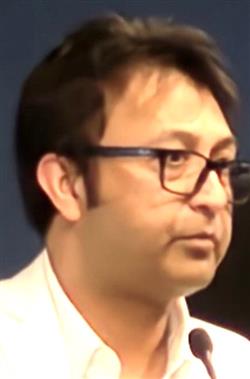 Rauf Arif Rauf Arif |
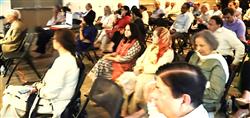 Audience |
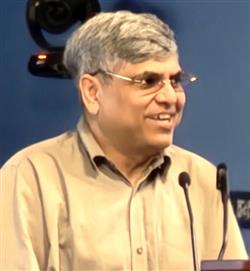
Ajit Sahi
|
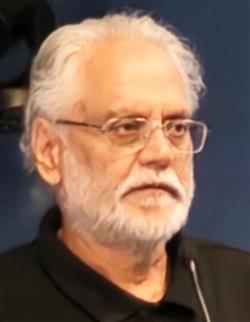 Anwar Iqbal |
 Audience |

A. Abdullah |

Yusuf Rahat |
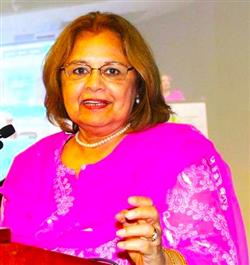
Nuzaira Azam |
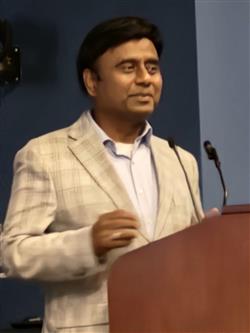
Faiz Rehman |

Tehniyet Azam |

Panelists |

Nuzaira Azam with family (Sarwat Parvez, Tasneem Sarwat, Nuzaira Azam, and Zafar Iqbal), |
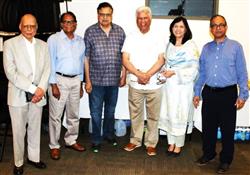
Some literary personalities (Syed Amir, Fazal Khan, A. Abdullah, Khalid Hameed, Mona Hameed, and Afzal Usmani) |
At an event organized by the Global Beat Foundation, the Aligarh Alumni Association, Metropolitan Washington, DC, and the University of Karachi Alumni Association of Metropolitan Washington, Nuzaira Azam launched her latest book, "Puri Kahani, SahafioN ki Zabani." Held on Saturday, May 25, 2024, in the Arlington Central Library's Auditorium in Arlington, Virginia, the book, edited by Nuzaira Azam and Akhlaq Ahmed, captures candid discussions with fifteen journalists (I. A. Rahman, Hussain Naqi, Mohammad Ziauddin, Mahmood Shaam, Mujeebur Rahman Shami, Anwar Sen Roy, Rabab Aisha, Shamim Ikramul Haq, Mahnaz Rahman, Shahnaz Ahad, Nazir Leghari, Nasir Zaidi, Fauzia Shahid, Mazhar Abbas, and Wusatullah Khan) about their tribulations, including persecution and imprisonment, while remaining committed to journalistic integrity. It is an anthology of online interviews with these journalists, some of whom faced brutal beatings, imprisonment, and unemployment. Sadly, two of them - I.A. Rahman and Mohammad Ziauddin - have since passed away.
The book underscores the challenges in journalism coinciding with the nation's shift towards a national security state, where legitimate inquiries into government actions are often perceived as anti-national. Media dynamics, influenced by establishment control, often result in pre-scripted news dominating media houses. Financial interests further sway these powerhouses, aligning them with official narratives. Deviations from sanctioned stances incur punitive measures, forcing journalists to navigate a delicate balance.
Nuzaira Azam noted that while social media has expanded opportunities for free expression, it has also introduced new challenges such as online harassment, cyber-attacks, and draconian cybercrime laws used to suppress dissent. Her organization, the Global Beat Foundation, supports journalists and journalism students by providing media training and empowering reporters from remote areas of Pakistan. She mentioned that despite efforts to engage right-leaning journalists, they had limited success, with Mujeebur Rahman Shaami being the sole exception.
Participating via Zoom from Karachi, Akhlaq Ahmed highlighted the logistical difficulties of arranging interviews due to the time differences between Pakistan and the USA. He emphasized the book’s primary objective: preserving these narratives for future journalists and historians. Ahmed also acknowledged the need for an English translation of the book, mentioning that efforts are underway.
Ajit Sahi, a recipient of numerous national and international awards for his courageous journalism and activism, highlighted that press freedom is a deeply entrenched issue throughout the subcontinent. He emphasized the interdependence of problems in these countries, asserting that they must be addressed collectively.
Tehniyet Azam, a PhD scholar at Pennsylvania State University, discussed the unique societal challenges faced by female journalists. She shared how her grandfather, Fatehul Azam, was a staunch advocate for gender equality and encouraged his daughter, Nuzaira Azam (Tehniyet's aunt), to pursue a career in journalism despite resistance from some extended family members.
Professor Rauf Arif of Towson University, veteran journalist Anwar Iqbal, media analyst Faiz Rehman, and renowned Urdu promoter and poet Dr A. Abdullah also shared their perspectives on the book. Additionally, Yusuf Rahat captivated the audience with a powerful recitation of his nazm, emphasizing the significance of the pen and learning.
Rahila Firdaus, a prominent PTV anchor and commentator, skillfully moderated the program.
Despite the long weekend, many Urdu enthusiasts and journalists attended the memorable event. Notable attendees included representatives from various literary and cultural associations, including AAA-DC’s Aslam Azad, UKAA’s Aquile Ahmed, Dr Renuka Misra, and this writer of the Global Organization of People of Indian Origin in America, VOA’s Khalid Hameed, and Indus Arts Council’s Kanwal Basheer. Poet Tahir Hanafi from Pakistan and writer Shafiuddin Usmani from India were also present.
The book was previously released in multiple locations across Pakistan, including Karachi, Lahore, and Islamabad. During the release ceremony at the Arts Council of Pakistan in Karachi, seasoned journalist Mahmood Shaam expressed his concerns about the challenges faced by young people in the country due to job insecurities and an uncertain future. He remarked, "Hamare naujawan Ishq karne ke bajae visa ki qataaron mein khade nazar aate hain" (our qualified youth are prioritizing visa applications over romance). Javed Jabbar, a former federal minister and noted journalist, suggested that the book should be mandatory reading for journalism students.
Audio-visual arrangements were coordinated by Tehniyet Azam, with photographs provided courtesy of Sarwat Parvez and Afzal Usmani. - Iqbal.zafar1509@gmail.com

